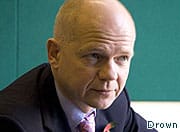Changing the law so that a Roman Catholic can ascend to the throne is not a priority for the coalition, the Foreign Secretary has said.
William Hague made it clear that the matter wasn’t “at the top of my list” but he did claim that it was “a legitimate issue for the long term”.
Mr Hague’s comments came in response to a parliamentary question by Labour MP Chris Bryant.
Defender
Currently the monarch is the Supreme Governor of the Church of England and the “Defender of the faith”.
Any attempt to overhaul the 1701 Act of Settlement is likely to prove highly controversial because it could jeopardise these positions, and pave the way for the disestablishment of the Church of England.
The Act currently bars members of the Royal Family from either converting to Roman Catholicism or marrying a Roman Catholic, unless they agree to be removed from the order of succession.
Overhauled
And Mr Bryant also called for an end to the rules on male primogeniture where the monarch’s son automatically ascends to the throne in preference to older sisters.
There have been a number of recent calls for the rules governing the monarchy to be overhauled.
Last month Labour peer Lord Dubs called for the Act to be overhauled, but the Bishop of Manchester warned that changing it could pave the way for a split between church and state.
Complex
Labour MP Keith Vaz, chairman of the Commons Home Affairs Committee, also called for the Act to be amended last month.
But a Government spokesman played down the prospect of change saying: “Amending the Act of Succession is a complex and difficult matter that requires careful and thoughtful consideration”.
In 2009 Gordon Brown announced plans to overhaul the monarchy which were greeted with alarm.
Endangered
A group of senior MPs including former MP Ann Widdecombe, a Roman Catholic, warned that Britain’s very identity as a Christian nation could be endangered by amending the Act.
Many Roman Catholics said the Act of Settlement was not a particular concern to them.
The plan to reform the monarchy was proposed in a Private Members Bill by former MP Evan Harris.

